Hello Formula 1 friends!
Can you believe we’re already a quarter of the way through the 2025 F1 season? Time flies when there’s almost as many race weekends as non-race weekends in a year!
In our short break before the next triple-header, I thought the quarter mark of the season would be a good point to examine how teams have been approaching their newsletter content thus far.
I’m a big fan of newsletters as a method of fan engagement, and there's increasing buzz around their value for non-traditional fan spaces (the lovely Lia Haberman has a great exploration of how beauty brands are starting to use newsletters as a community-building tool, for example). Unlike social media where a follow is quite low-effort, newsletters require a conscious opt-in and sharing of data that signals a deeper willingness to be involved in your community (…or they just wanted to enter a competition. But the potential remains!). While TikTok is trendy, there’s a reason newsletters have stood the test of time. Artists like Lorde use newsletters as a primary marketing channel with great success, and outlets like Shit You Should Care About engage with almost a quarter of a million (primarily Gen-Z!) subscribers via their mailing lists, proving there is, in fact, more to community building than short-form video (also, Luce at SYSCA loves a cheeky bit of F1, should any teams want a perfect newsletter collab!). Newsletters are also the most generation-neutral of all modes of messaging, allowing you to directly connect with your fans regardless of what social media account they’re using on any particular day. Gen-Z (and increasingly Gen-Alpha) are the buzziest audience segments for marketers (and are the fastest-growing group for Formula 1), however, data suggests 58% of F1 fans are over 35 (aka elder millennials, Gen X and Baby Boomers). Effective fan engagement should look at how they can reach an entire audience and not just put all of their eggs into who is getting the most air time.
So, how have the ten Formula 1 teams been engaging with their mailing lists in the first quarter of the season?
Jump to:
Notes on data:
The information below is from the period between the 11th of February (one week prior to the F175 launch event) and 7th May (AEST). This covers the season launch and the first six races of the season, and is a span of approximately fourteen weeks.
Some clarifying details:
Total emails: The number of emails I personally received in my inbox after subscribing to their newsletter. Due to the potential segmentation of mailing lists, this may not account for all messages actually sent by the team, however, without access to their internal data, this is the best I can do.
Sales emails: An email where the majority of the content in the message relates to merchandise/an online store.
Competition: An email where the subject line/main purpose of the email is to advertise a competition/giveaway. I have not counted other emails that mention a competition as part of broader messaging.
Alpine
Total emails: 26 (1.86/week)
Sales emails: 8 (30.7%)
Competitions: 1
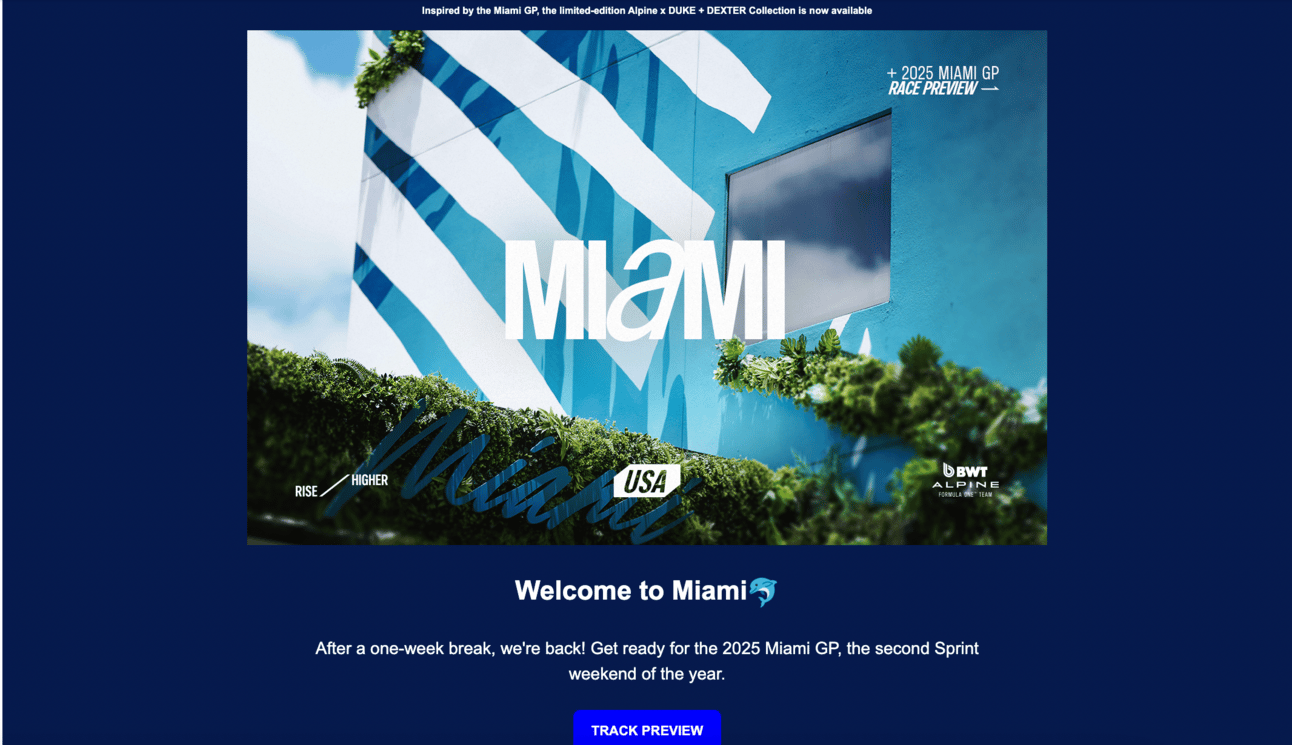
Notes: You may remember that for the first half of the 2024 season Alpine did not have a newsletter, so really, any content from them should be seen as a big improvement on this time last year. Their newsletter is pretty standard, linking to race previews/recaps, giveaways, their new fan platform, and their online store. Nothing to write home about, but it serves its purpose as an information hub, albeit one that doesn’t add any new information to the mix.
Aston Martin
Total emails: 22 (1.6/week)
Sales emails: 6 (27.3%)
Competitions: 4
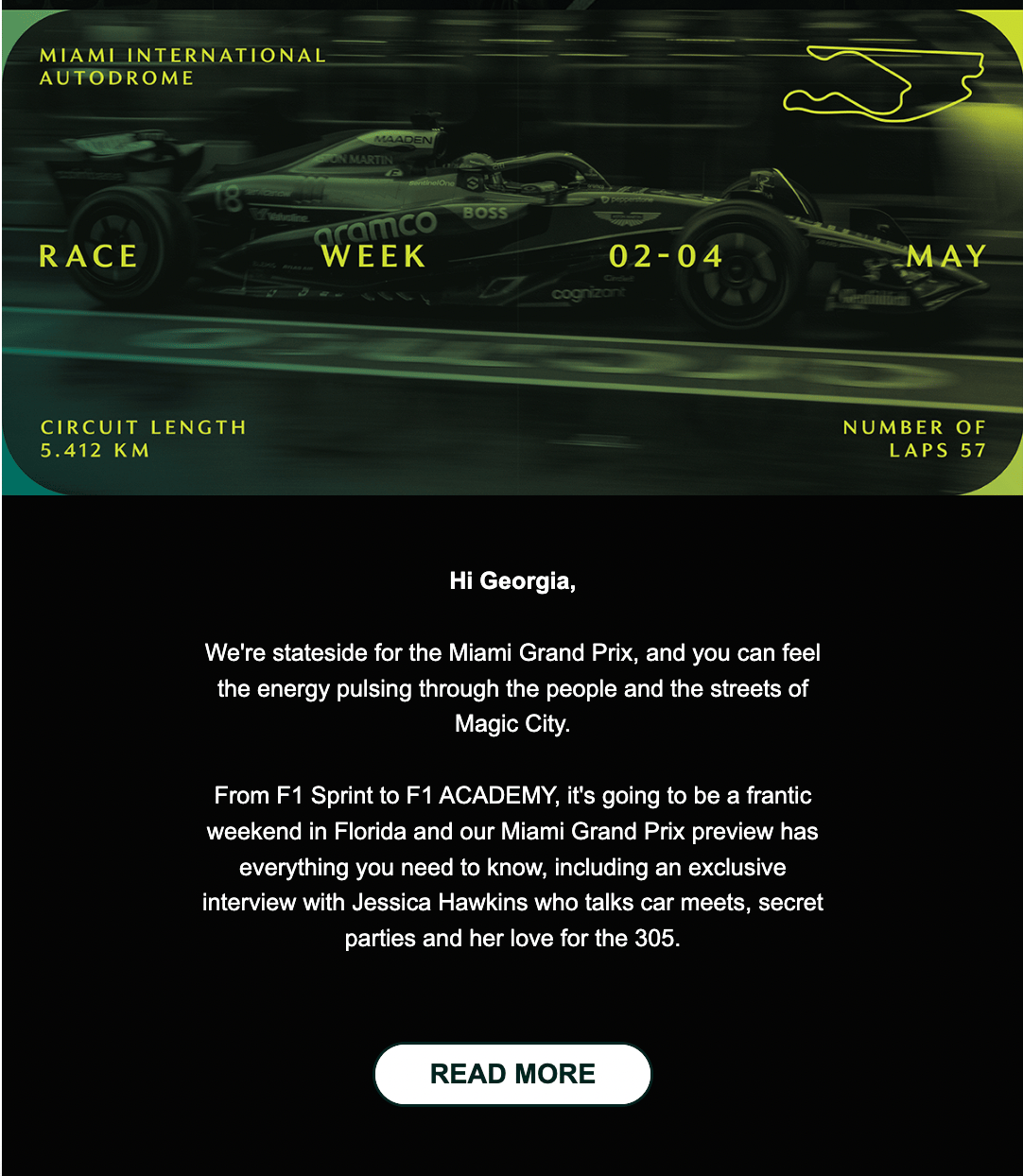
Notes: Aston Martin are the only who personalise their messages, which still baffles me. Aston are one of the few teams who write more than a single sentence as an introduction to their messaging, although most of the body of the newsletter is made up of sponsor logos rather than actual content. Aston have the second most variety in terms of the types of messages they send (linking in to their I/AM membership program), but there’s still a lot of room to grow what each individual email could include.
Ferrari
Total emails: 42 (3/week)
Sales emails: 29 (69%)
Competitions: 0
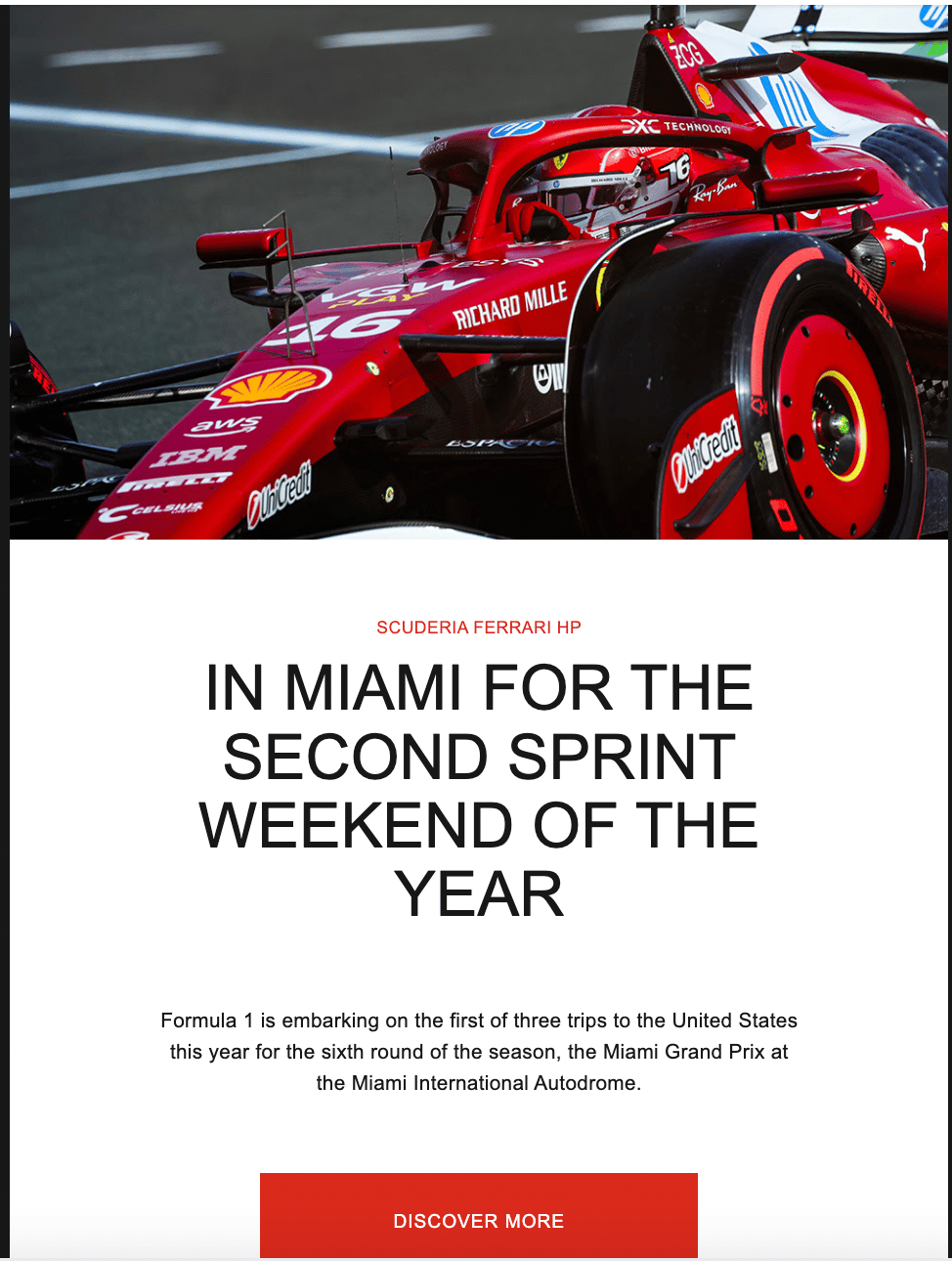
Notes: Ferrari send emails from two lists: their store, and their actual team content. Unfortunately, the ratio is skewed in the wrong direction (2/3 sales to 1/3 information), but at least the information-based messaging exists. That being said, it’s not exactly a huge amount of information being shared, with bare-bones information about the race weekend, links to their website, and more sponsor-specific messages than other teams tend to share. They also link to their VIP hospitality packages (I guess a fan can dream), and remind fans that they have an app (which, to be fair, does offer a great range of content. But the existence of the app doesn’t mean effort can’t also be given to their newsletter).
Haas
Total emails: 15 (1.1/week)
Sales emails: 4 (26.7%)
Competitions: 0
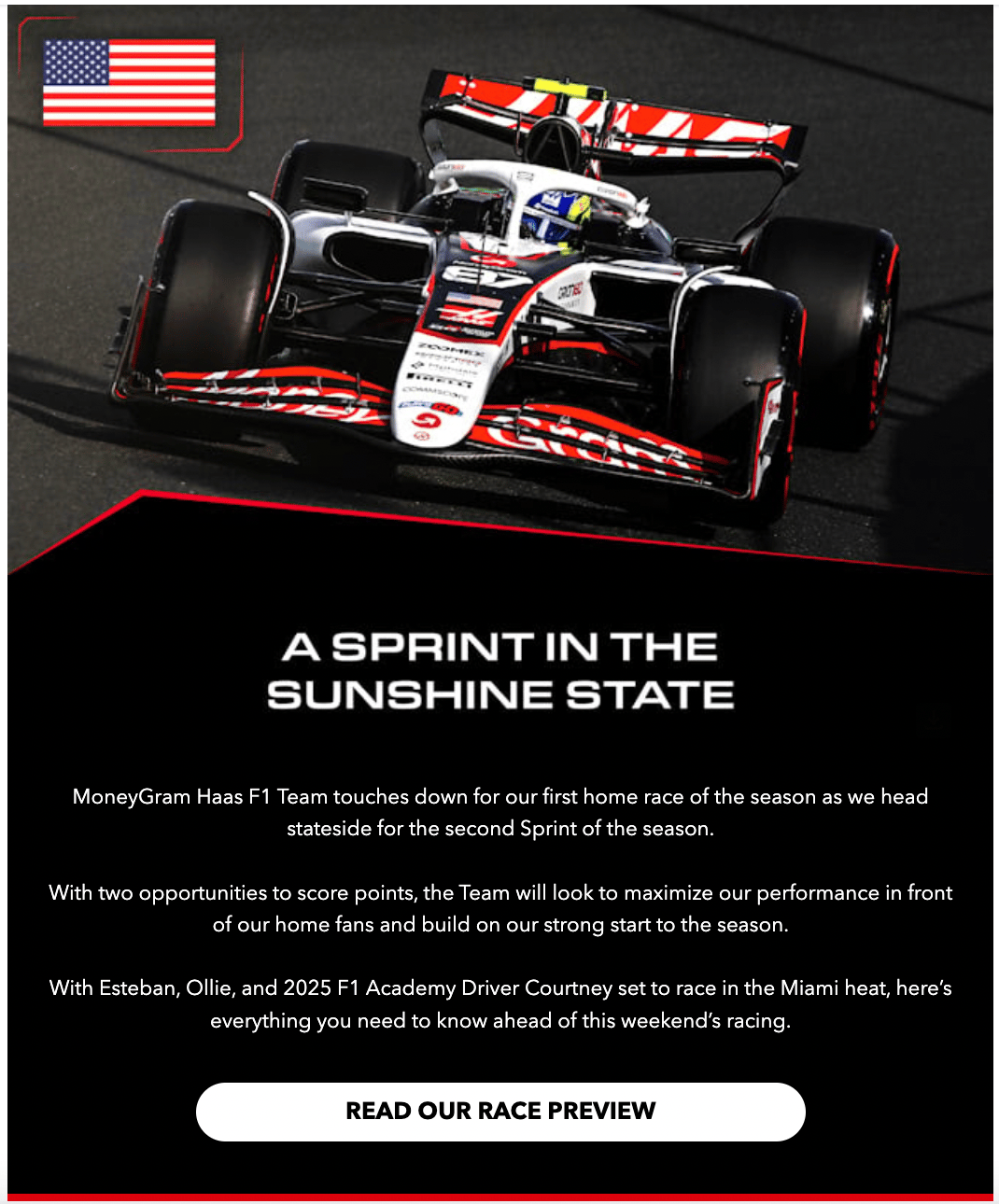
Notes: Like Aston Martin, Haas also put a bit of effort into writing more than an introductory sentence of their newsletters, which is always nice to see. They also include full quotes from their drivers and Team Principal inside their post-race newsletters rather than linking to website statements, which is a nice change to some of the other teams. While the newsletters are nothing fancy, they do at least show content is being drafted for this specific purpose, rather than just relying on external links.
McLaren
Total emails: 18 (1.3/week)
Sales emails: 5 (27.7%)
Competitions: 2
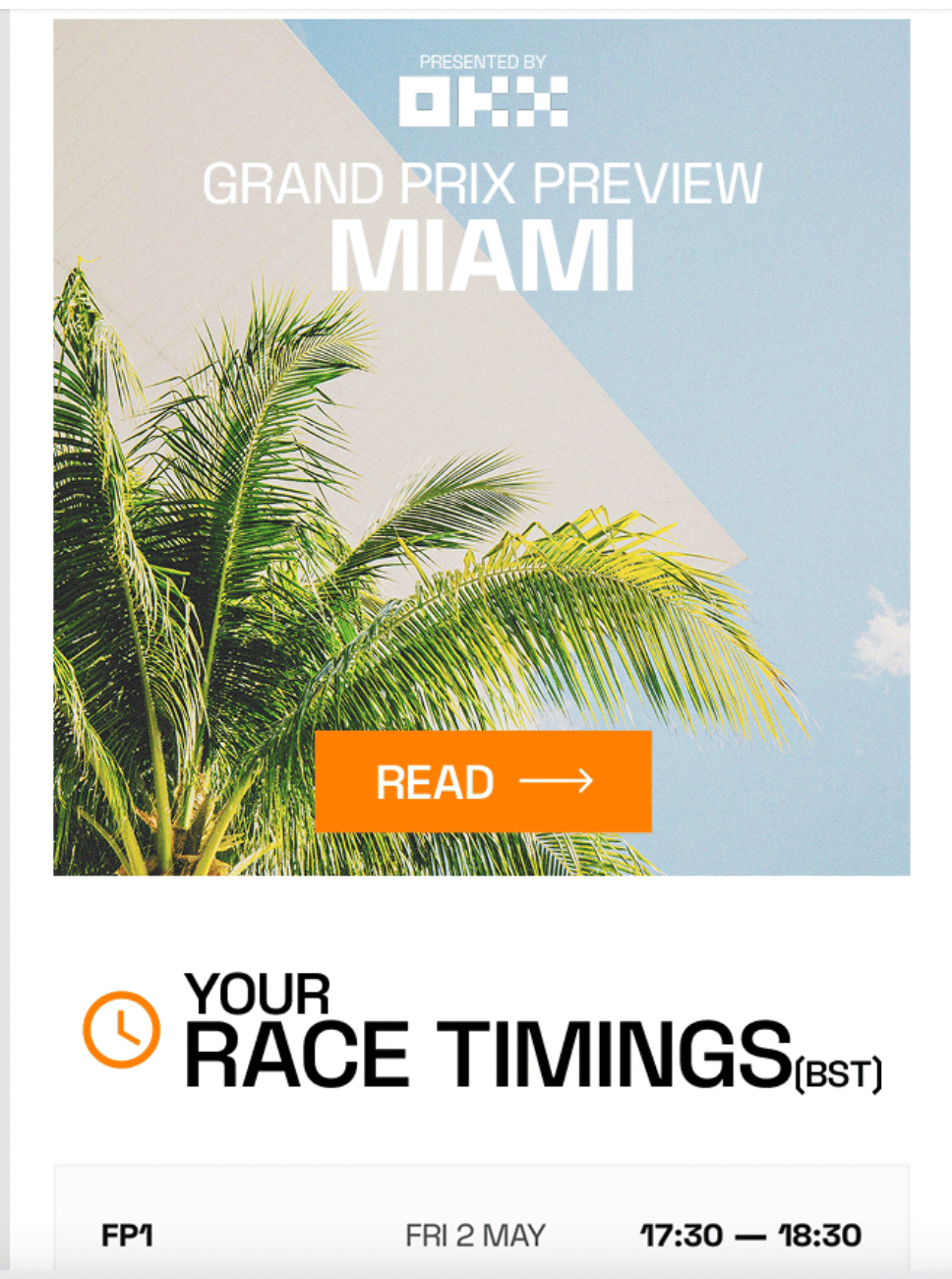
Notes: McLaren’s newsletters are purely a vessel to drive you to their website. They share key information in the form of graphics, but there’s no story being told that you can’t find elsewhere on their social media or website. McLaren claim to have a membership program called “McLaren Plus”, but the program is literally just this newsletter, which shows a disappointing amount of effort being given to their overall fan engagement strategy.
Mercedes
Total emails: 36 (2.6/week)
Sales emails: 34 (94.4%)
Competitions: 0
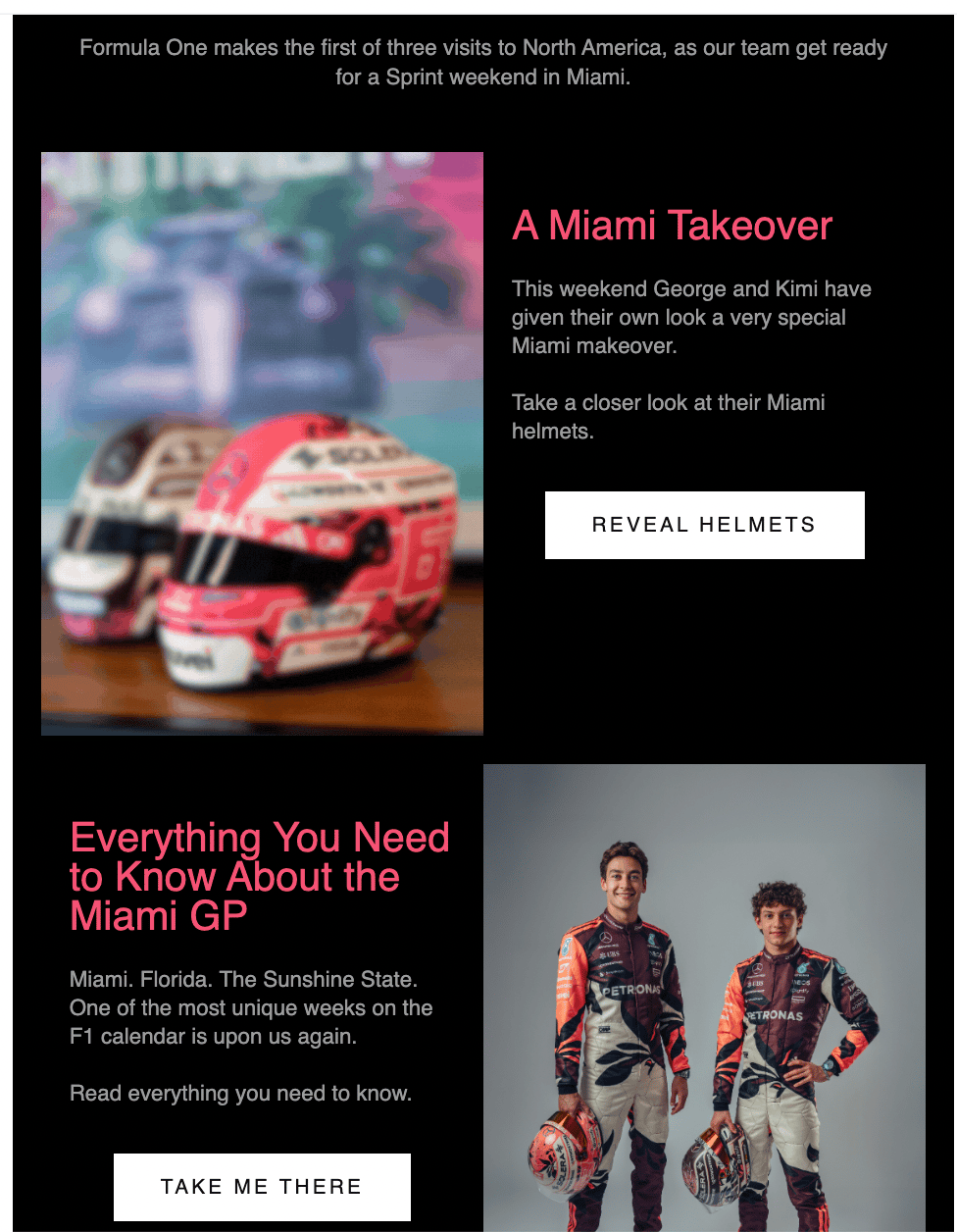
Notes: It took 157 emails from Mercedes before I received one that wasn’t just a sales catalogue, but we finally got there last month. A majority of the content from Mercedes is still output from their online store, but we’re seeing some baby steps being made towards actual information and engagement hitting the inboxes of fans. C’mon, Mercedes! Show us what you’re actually capable of!
Red Bull
Total emails: 24 (1.7/week)
Sales emails: 1 (8.3%)
Competitions: 2

Notes: Much like McLaren, Red Bull’s newsletters are almost the antithesis of what a newsletter should be. They contain very little (if any) text, instead relying on graphics that link to their website. Which, sure, is an easy way to share information but newsletters are supposed to be avenues for storytelling that add to a conversation, rather than just replicating existing content and driving clicks to your website. If there’s no unique information in your newsletter, why am I subscribed to it?
Sauber
Total emails: 4 (0.3/week)
Sales emails: 4 (100%)
Competitions: 0

Notes: Honestly, there’s not much to say about poor old Sauber. Their online store sending sporadic messages is an improvement on last season, but they still have no content-based newsletter or easy sign-up on their website. I just don’t understand the lack of strategy here.
VCARB
Total emails: 26 (1.9/week)
Sales emails: 2 (7.7%)
Competitions: 7
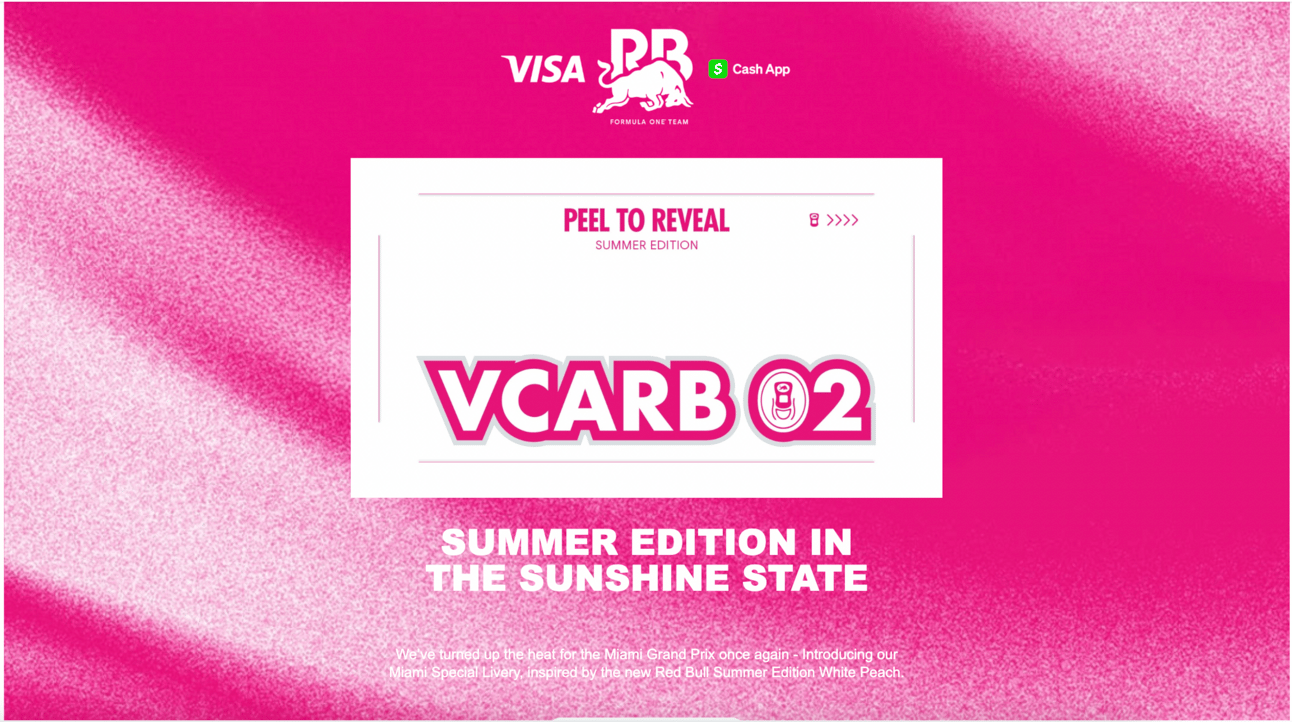
Notes: There must be a bit of a shared newsletter strategy with VCARB and Red Bull, as the VCARB newsletters are also very light on text and unique content. Their use of white text on glittery-coloured backgrounds is also difficult to read at times and fails an accessibility contrast check. Let’s not ignore accessibility guidelines for an illusion of “cute” content.
Williams
Total emails: 66 (4.7/week)
Sales emails: 8 (12.1%)
Competitions: 15
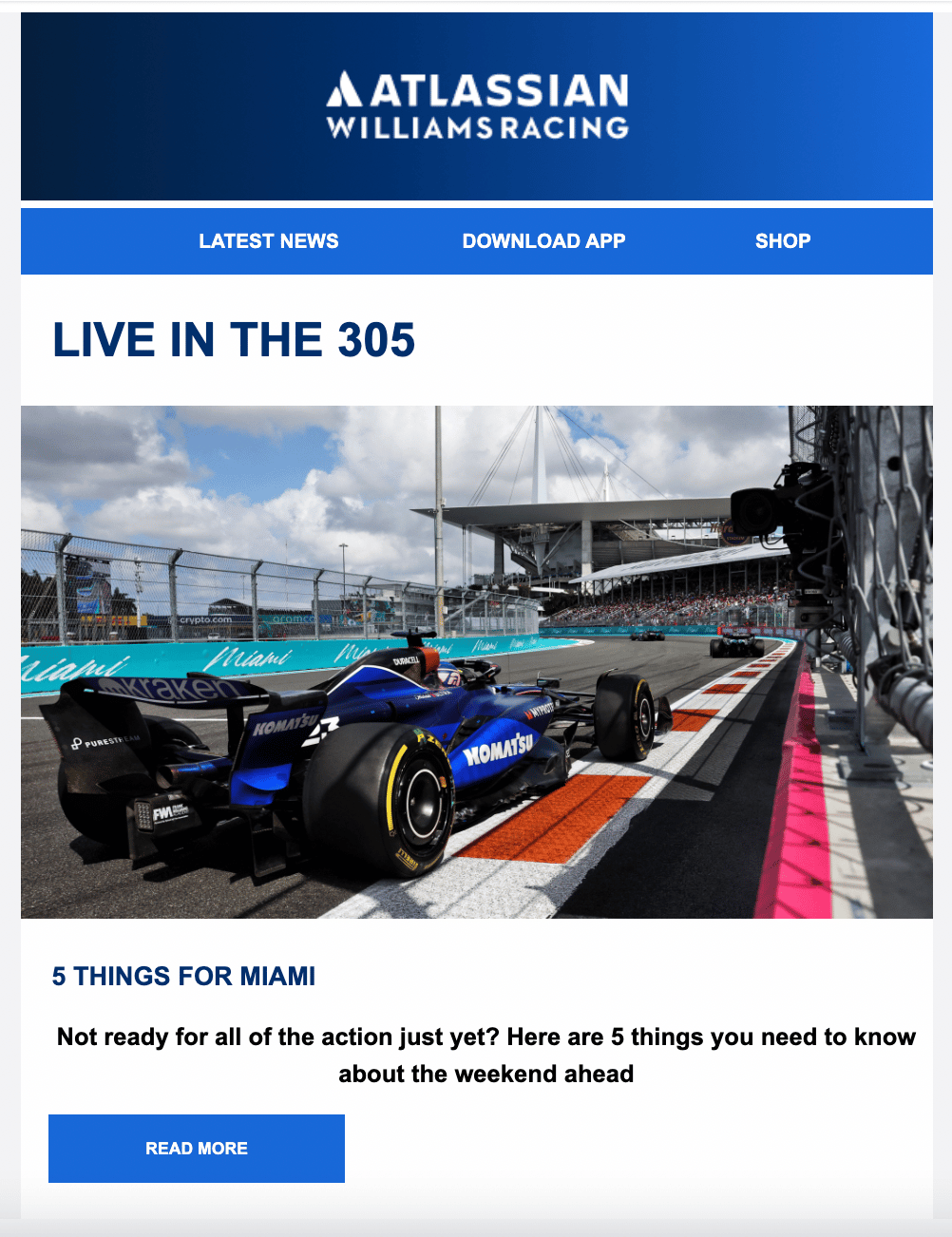
Notes: Williams are by far the most prolific newsletter senders, sending an average of almost one per working day. If you’ve been following my work for a while you would know that I believe Williams have the best fan engagement on the grid, and while their newsletters aren’t the fanciest, they do show the best understanding of ways to communicate with fans. They’re not purely relying on sales messages or end of weekend race recaps. They’re inviting fans into their membership program, reminding them of competitions and offers, and sharing IRL opportunities for community building and engagement. While yes, they also fall into the category of “linking to content on our website”, when you look at their overall output, they’re coming out on top.
Concluding Thoughts
First thing’s first, let’s focus on a positive: As we can see in the below graph, most teams have more than two-thirds of their newsletters focusing on information rather than sales. Ferrari, Mercedes and Sauber have work to do, but it’s great to see an emphasis on content over purely pushing merchandise for the other seven teams.
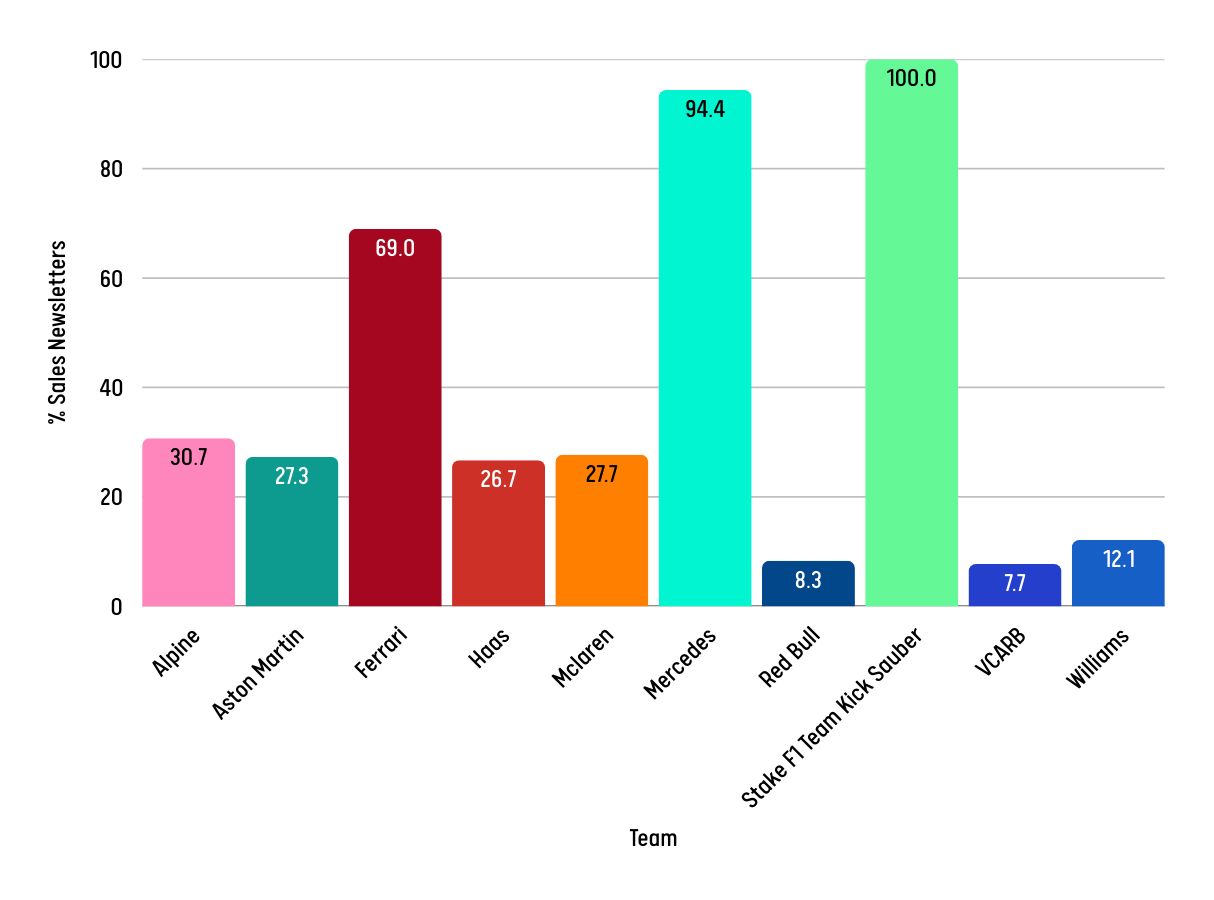
Percentage of total newsletters with purely sales messaging
Now, onto the less positive: It’s pretty clear to me that most of the teams don’t understand the full potential of a newsletter as its own communication channel. Yes, marketing teams are stretched thin and creating unique content for a newsletter requires capacity many of them may not have (believe me, I’ve been there in previous roles!), but there’s so much being left on the table.
If I’m opening a newsletter, I also want it to contain the key information in the newsletter. Yes, I’ll click out to enter a competition or to follow a reference link, but if your email is asking me to follow a link as its default mode of information-sharing, I have to ask if you understand the medium. I could just go straight to your website and find everything and save my inbox the clutter!
Newsletters are also the perfect vessel for offering unique, subscriber-only offers, and yet most teams aren’t jumping on board that mode of engagement, either. If you’re sending me to your website for all of the information, and you’re advertising the same giveaways as you are on social media and your website…why am I subscribed to you? What’s the value add?
A newsletter shouldn’t be seen as a box-ticking exercise, and I would love to see some teams experiment with storytelling and modes of connection that go further than linking to content that was written for a separate medium. Newsletters can be a conversation. They can be used to share stories, allow you to experiment with voice (much like Threads allows experimentation with the “admin” persona - more on this soon!), and allow fans to build deeper connections that convert into long-term loyalty and spending. Remember, fans don’t connect with corporations, and newsletters are an excellent way to help you humanise yourself.
After going two years without catching any kind of illness, I’ve now had two awful colds in two months that have knocked out the free time I usually devote to things like this research. Thankfully, the latest cold-turned-chest-infection (which arrived a week before my half marathon - rude!) has now cleared, and I should be back on schedule to pump out some more content in the coming weeks.
Thanks for sticking around despite my sporadic outputs!
‘Til next time!